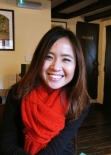Pobsook Chamchong
With the movie ‘Man of Steel’ now showing in cinemas I’ve heard the song ‘Superman (it’s not easy)’ again, and it made me think about my life as a PhD student. Before I became a PhD student, I thought that it wouldn’t be that hard compared with being Superman – but it turns out that it’s not so easy either.
Being a second year PhD student, I have responded to many questions about PhD life from my friends – prospective students and those just thinking about studying for a PhD. So, I think this is a good opportunity to share my experience about the life of a PhD student.
Accessing data
My thesis concerns investigating collaboration between local governments in England and Thailand, selecting cases in Thailand is not difficult as I worked with key people in this policy area before I came to study in the UK.
However, selecting the UK cases was more difficult. Although I could use the criteria related to my research objective and questions that I developed to select the cases, the issue of the gatekeeper, i.e. the key person who makes the final decision to allow the researcher access to the case study data (such as the chief executive of a local authority) gave rise to difficulties in collecting data. But with the support of INLOGOV I was able to make use of contacts, connections and knowledge of local authority collaboration in England – combined with a purposive sampling technique – to enable me to avoid problems associated with gatekeeping.
Supervision
The supervisor is the most important person in your PhD studies, and I’ve had quite a few questions about the most appropriate ways to communicate with supervisors. I have supervision meetings twice a month, which is the standard procedure at INLOGOV.
From my experience, I found it useful to tell supervisors both what you do know and what you don’t know. Don’t hesitate to ask them questions because you will get useful advice. Moreover, I learnt from my supervisors that doing a PhD is not a linear process and it’s more like doing a jigsaw puzzle. So, it’s useful to be flexible and revise your work after receiving recommendations from your supervisors and the progress review committee – and to be strong enough to make academic arguments to support the choices that you have made.
A supportive environment
I found that it’s very important to have friends who are in the same boat as me. Unlike many universities in the UK, PhD students in the social sciences at the University of Birmingham study core modules in social research in the first year in order to gain skills and knowledge to be applied in their PhD studies. Besides this knowledge and skills, however, studying these modules allowed me to meet and work with other PhD students – we’ve become friends and help each other, travel together and discuss issues.
Being an international student and living outside my home country, it’s so good to have friends with whom I can share my thoughts and feelings, discuss both academic and personal issues, and give me a big hug when needed! Moreover, as the university provides offices and facilities for PhD students to work together, this hub has provided a chance for me to meet senior students. I don’t hesitate to ask them for advice, and these students are more than happy to help with any challenges that they’ve met before.
Balancing personal and academic life
Finally, one of the most important things is to find a way to balance your personal life and your academic life. Studying cannot be the only thing – I can say I study quite hard but I also play hard! Even though I’m a full time student that doesn’t mean I have to work office hours Monday-Friday, and one of the really nice things about doing a PhD is having the flexibility to work at different times of the week as suits my circumstances.
So, for all the reasons above, I think that being a PhD student at INLOGOV isn’t easy – but it’s not too hard to be either. Why not come and see for yourself?
Pobsook Chamchong is a Thai Government Scholarship PhD student at INLOGOV. Before coming to Birmingham, she previously worked as a researcher for the Thailand Political Development Councils and for the Thailand Reform Committee.
